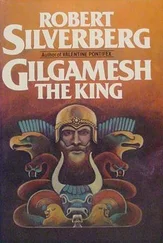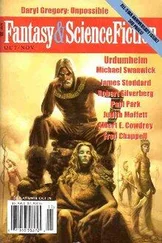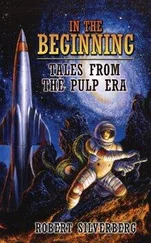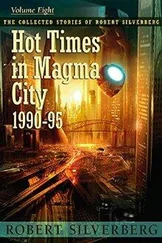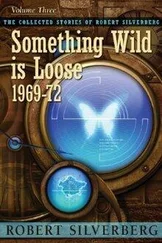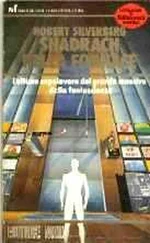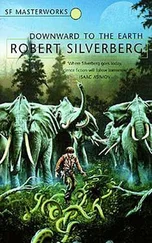Immediately all movement halts in the city. Everyone freezes; every head turns toward Cotopaxi. The white column, pouring from the vent with incredible velocity, rising already to a height of at least a thousand meters above Cotopaxi’s summit, is spreading now, filling the sky like a broad plume of feathers, a cloak of live steam. Mordecai perceives a low droning rumbling sound, as of a train passing through the city, but a train for giants, a titanic train that makes lanterns sway and potted plants topple from balconies. The cloud of steam has turned gray on top, with tinges of red and yellow toward its outer edges.
— ¡Aie! ¡El fin del mundo!
— ¡Madre de dios! ¡La montaña!
— ¡Ayuda! ¡Ayuda! ¡Ayuda!
And the flight from Quito begins. Nothing has happened yet, nothing but a roar and a hiss and a column of steam rushing skyward, but nevertheless the people of the city abandon their houses, carrying little or nothing, grasping perhaps a crucifix or a child or a cat or a handful of clothes, crowding into the streets, shuffling somberly downhill, northward, long lines of people moving with hunched shoulders, no one looking back, everyone heading out of the city, heading away from Cotopaxi, from the frightening crimson cloud that now looms over the mountain, from the death that soon will come to Quito. These are people wise in the way of volcanoes, and they do not care to stay for the show. Shadrach Mordecai is swept along in the human tide. He towers over these folk as the volcano does over the city, and they glance strangely at him and some tug at his arms in a kind of appeal, as if they think he is a black deity come to lead them to safety. But he is leading no one. He is following, he is fleeing helplessly with all the rest. Unlike them he does look over his shoulder every few minutes. Whenever he can, whenever the press of refugees is not too powerful, he pauses and turns to see what is happening. The volcano now is spurting little bursts of pumice and light ash, wind-borne powdery stuff that changes the color of the air, staining it yellow, deepening the sun’s hues to an orange-red. The earth seems to be groaning. The whole city shakes. Automobiles laden with well-dressed citizens move slowly through the streets, unable to make headway in the throngs of shuffling pedestrians; there are collisions, shouts, quarrels. Soon the cars have halted altogether and their passengers, quirky-lipped and disdainful, shoulder their way into the lines of humbler folk. Shadrach has been marching for an hour or two now, perhaps three, mechanically pushing himself along; the air has grown thin and chilly, with an acrid reek of brimstone in it, and though it is only the middle of the afternoon the falling ash has so obscured the light that the street lamps have come on — the ash is accumulating like fine snow in the streets, already ankle-deep — and still Cotopaxi roars and hisses, and still the people straggle northward. Mordecai knows what will happen soon. With the eerie double-edged vision of the time traveler, he looks forward as well as back, remembering the future. Before long there will be the explosion that will be heard thousands of miles away, the earthquake, the clouds of poisonous gas, the lunatic outpouring of tons of volcanic ash that will blot out the sun all over the world, and on this night of Cotopaxi the ancient gods will be let loose on earth and empires will crumble. He has lived through this night once already, but not with the knowledge he now has. Somewhere far away at this moment is fifteen-year-old Shadrach, all arms and legs and huge eyes, doing his lessons and dreaming of medical school, and he will hear the explosion too, dull and muffled though it will sound after spanning the planet from Quito to Philadelphia, and he will think it is a terrorist’s bomb, perhaps, going off downtown, but in the morning he will see the sky tinted yellow and the swollen sun gone all red, and then the fine dust will fall for days, bringing early twilights on these summer evenings, and news will trickle out of South America of the terrible eruption, the loss of hundreds of thousands of lives. What that young Shadrach does not know, what no one knows except the stranger striding through the northern outskirts of Quito under a dirty crimson cloud, is that the eruption of Cotopaxi is more than a natural event: it signals a political apocalypse, the fall of the nations about to begin, the time of Genghis Mao about to arrive.
— ¡El fin del mundo!
Yes. Yes. The end of the world. And now the explosion comes.
It happens in stages, first five quick sharp reports like cannon-fire; then a long moment of total silence when even the persistent rumble that has gone on for hours abruptly halts; then a violent shaking of the earth and a single monstrous booming sound, the loudest sound Mordecai has ever heard, a sound that breaks windows and splits walls; then silence again; then the rumbling once more; then more cannonfire, bang bang bang, quick hard pops; then a second great boom, five times as powerful as the first, that drops people to their knees, clutching at their ears; then silence, an ominous, sinister, nerve-tightening silence; and then the sound of sounds, the sound of a planet splitting apart at its core, an unending grotesque avalanche of sound that makes the neck snap and the arms jerk wildly and the eyes jiggle in then-sockets, a sound that rolls over Quito like the trampling foot of an angry god. And the sky turns black and a torrent of red fire spills out of Cotopaxi and burns with a hideous glare on the horizon. The mountain appears to be ripping open. Shadrach can see huge chunks of its crest, slabs of rock that must be the size of great buildings, flying loose and soaring slowly and grandly toward Quito. The perfect cone, once as graceful as Mount Fuji’s, is a ruin now; a shattered wreck, dimly visible through the dense clouds of ash and the flying balls of pumice; it is only a stump, irregular and ghastly. The air itself is burning. People still struggle onward, moving even more slowly, dragging themselves along on leaden legs toward a salvation that is not to be reached, but they vomit, they clutch at their throats, they gasp, they choke, they fall.
— Ayuda . Ayuda.
But there is no help to be had. They are dying here in the early afternoon of this sparkling day, sparkling no longer. Shadrach, trying to breathe an atmosphere that is half ash and half carbon monoxide, falls himself, gets up, falls again, forces himself to rise. He remembers that he is a doctor and kneels beside a fallen woman, a girl, really, whose face is distorted and nearly as black as his own from asphyxiation.
— Yo soy un médico.
— Gracias , señor. Gracias.
Her eyes flutter. She looks to him for aid, medicine, a drink of water, anything. How can he help her? He is a doctor, yes, but can he teach the dying to breathe poisoned air? She gags, shivers, and then — strangely — yawns. She is falling asleep in his arms. But it is a deadly drowsiness, and she will not wake. He releases her. He moves onward, handkerchief over his mouth and nose. Useless. Useless. He falls again and does not rise, he lies in a heap of weeping murmuring victims, a victim himself. So this is how it was on the night of Cotopaxi. Night and ash, flight and death. That saucy boy, those women roasting bits of meat, the shopkeepers and the bankers, the cab drivers and the policemen, that fall black-skinned stranger, all dying together now, the hours of frenzied flight a waste, and Cotopaxi’s ashy ejecta filling the heavens, giving all the world a blood-red twilight. El fin del mundo, yes. Shadrach claws at the ashes filling his mouth. There is another explosion, a lesser one now — for what could equal that last unimaginable apocalyptic blast? — and another, another, and he knows that the booms will continue in diminishing intensity for many hours, even for days. No one will sleep tonight in Ecuador, in Colombia, Venezuela, in all of Central America, even in Mexico; the dread thunder of Cotopaxi will resound in Canada, in Patagonia, it will reach far across both oceans, and by dawn, the dust-choked dawn, the black dawn through which no light can penetrate, the first revolution will be under way, the putsch in Brazil, the insurrectionists taking advantage of the strange darkness and the universal terror to launch their long-awaited coup; and then the chain reaction, the uprisings triggered by the Brazilian one in Argentina, Nicaragua, Algeria, Indonesia, one bloodbath providing the cue for the next, and all spurred by Cotopaxi, by the great symbol-freighted upheaval of the volcano; the economic crises of the 1970s and the repressions and shortages of the impoverished 1980s leading inexorably to the worldwide chaos of 1991, the global revolution, the long Walpurgisnacht touched off in some incalculable way by the eruption.
Читать дальше

